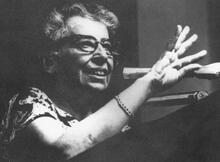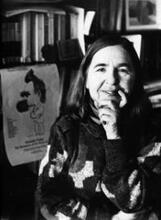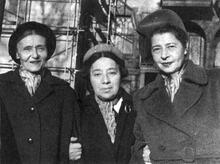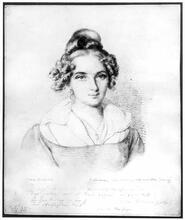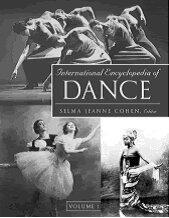Käte Hamburger
Literary scholar Käte Hamburger received a strong education, despite common limitations on women’s education in early twentieth-century Germany. She studied philosophy, receiving her doctorate in 1922. Early on, she turned o literature, always taking a philosophical approach. When the Nazis came to power, she fled to Sweden via France. She lived in Gothenburg, learned Swedish, and worked as a freelance journalist as well as a German teacher and private tutor. After her magnum opus on the behavior of the grammatical tense, a statement of reality, in a fictional structure such as the novel. This work enabled her to return to Germany, receive her habilitation, and become a university professor.
Article
Literary scholar Käte Hamburger was born on September 21, 1896, in Hamburg, Germany. She grew up in a bourgeois home that, despite her being as a woman, allowed her to follow a "relatively orderly course of academic training, even through the World War" (Hamburger, Speech at the Honorary Doctorate, 1980). She studied philosophy and received her doctorate in Munich in 1922, with a thesis on Friedrich Schiller.
The topics Hamburger worked on in the course of her "writing life" became truly her own. Thus, reading Jean Paul's Titan during an illness shortly after she received her doctorate gave rise to her treatise The Death Problem of Jean Paul (DVjs 7, 1929). Already here we see Hamburger’s turn to literature, although her approach always remained a philosophical one.
From 1928 on, Hamburger served as assistant Paul Hofmann (1880-1947), a Berlin philosopher and scholar of theologian and philosopher Wilhelm Dilthey. In 1929, she investigated the theoretical significance of mathematics for Romantic universal poetry in the essay “Novalis und die Mathematik” (Romantik-Forschungen, Halle), which is still fundamental today. Around the same time (1930), Hamburger became interested in Thomas Mann’s oeuvre, which occupied her throughout her life (Thomas Mann und die Romantik, Berlin 1932). Her research remained committed to the Goethe era’s ideal of humanity of the Goethe era.
When the Nazis came to power in 1933, Hamburger had to leave Germany. She fled to Sweden via France, where−not by chance−her work on Rahel Varnhagen's veneration of Goethe appeared (Revue Germanique, 1934). Hamburger lived in Gothenburg, learned Swedish, and worked as a freelance journalist as well as a German teacher and private tutor.
The grammar she dealt with in language teaching inspired Hamburger to write Die Logik der Dichtung (The Logic of Poetry, Stuttgart 1957), which became her magnum opus. Here she asked how the grammatical tense, which is a statement of reality, behaves in a fictional structure such as the novel, thus calling into question the traditional theory of genre. It was not least this sensational study that prompted Fritz Martini to invite her to Stuttgart in 1957, where she received her habilitation (a formal qualification necessary in Germany for teaching at the university level) in 1959. From then on Hamburger taught as an associate professor, finally finding a sphere of activity appropriate to her.
Käte Hamburger died in Stuttgart on April 8, 1992.
Selected Works
Thomas Manns Roman 'Joseph und seine Brüder.' Stockholm: Bermann Fischer Verlag, 1945.
Rainer Maria Rilke. Stockholm: 1949.
Leo Tolstoy. Gestalt und Problem. Bern: A Francke, 1950.
Von Sophokles zu Sartre. Stuttgart: Kohlhammer, 1962.
Philosophie der Dichter. Stuttgart: Kohlhammer, 1966.
Wahrheit und ästhetische Wahrheit. Stuttgart: Klett-Cotta, 1979.
Thomas Manns biblisches Werk. Munich: 1981.
Das Mitleid. Stuttgart: 1985.
Briefwechsel Käte Hamburger − Klaus Schröter 1964−1990. Hamburg: 1994.
Philosophische Werke und Briefe. Edited by Ralf Klausnitzer. Göttingen: 2001.
Honorary doctorate Käte Hamburger. Siegen, 1980.
Kreuzer, H. And J. Kühnel: KH zum 90ten Geburtstag. Siegen: 1986.
Bossinade, J. and A. Schaser, eds. Käte Hamburger: Zur Aktualität einer Klassikerin. Göttingen: Wallstein Verlag, 2003.
Gülcher, N. and I. von der Lühe, eds. Ethik und Ästhetik des Mitleids. Freiburg/Br.: Rombach Druck und Verlagshaus, 2007.
Löschner, C. Denksystem. Logik und Dichtung bei Käte Hamburger. Berlin: Ripperger & Kremers, 2013.
Albrecht, A. and C. Löschner. Käte Hamburger. Kontext, Theorie und Praxis, Berlin/Boston: Walter de Gruyter, 2015.
https://www.srcts.uni-stuttgart.de/forschung/hamburger/


